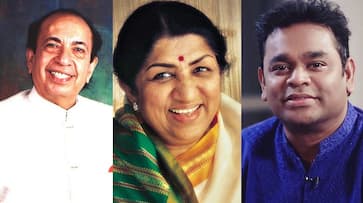Under the genre of veera rasa in Indian poetry and music figure these songs dedicated to the nation. When you ought to make a film out of such a song, a lot goes into making it a memorable experience with a long shelf life. Here are some behind-the-scene episodes of five famous songs.
On occasions such as the Independence Day and the Republic Day, it is customary for a music channel on television to broadcast patriotic songs one after another. However, few tell you the stories behind the making of these songs. MyNation attempts to bring forth the people who — and the things that — created these gems for Hindi cinema and playback singing.
Ai mere watan ke logon (non-film song)
That this song, arguably the most popular patriotic number in the country, was dedicated to the Indian soldiers who fought the 1962 War against China and that India’s first Prime Minister Jawaharlal Nehru broke down on hearing the rendition by Lata Mangeshkar are well-known facts.
Few know that the idea of this song struck Kavi Pradeep as he was strolling down the Mahim beach of Bombay (now Mumbai). He was in such a hurry to give the concept a shape that he scribbled the song on a pack of cigarettes he was carrying.
Lata Mangeshkar had initially declined the song composed by C Ramchandra because of lack of adequate rehearsal. In the meantime, some misunderstanding had vitiated the singer’s relationship with the lyricist, which made the song reach Asha Bhosle. However, everybody associated with the song finally arrived at the consensus that Lata’s voice alone could do justice to this song. The rest, as they say, is history.
Mere desh ki dharti (Upkar)
Made after the 1965 war with Pakistan, Upkar had the most famous song Mahendra Kapoor ever lent his voice to. Few know, a large part of the film was shot in Delhi. It’s village Ghoga in Narela with pin code 110040. One may still visit the temple of Lord Shiva seen in the film situated in this area.
Kapoor won the National Award for Best Male Playback Singer for the song, which also gave Gulshan Bawra the Filmfare Best Lyricist Award.
Sandeshe aate hain (Border)
This song from the 1997 film brought out the pathos of a soldier leaving his home and family — often in dire straits calling for his constant attention — to join a war.
Javed Akhtar, comfortable more in similes than metaphors that Gulzar excels in, had a field day penning this prosaic poem. A not-so-well-known fact about this song is that, one of the singers, Roop Kumar Rathod had recently diversified from tabla recitals where he was used to using a high-pitched voice to spell the rhythms. Here, he made efforts to turn his throat deep.
Vandemataram by AR Rahman (music video)
This modern version of Bankim Chandra Chattopadhyay’s poem from Anandamath — the first stanza of which is the National Song of India — led to a huge controversy as some Islamic fundamentalists accused composer AR Rahman of idolatry.
The little-known fact about this version is that Rahman is a friend of Bharat Bala, the producer of the music video. Bharat’s father V Ganapathy is said to have inspired him not only for this version of Vandemataram but also several other, short patriotic films and socially relevant advertisements.
“We used three songs to reflect the three colours of the Indian flag. Saffron is the colour of passion. The song was Ma tujhe salaam. We used a much bigger canvas and real people in the video. No sequence was choreographed; even the landscape used is real. We had several thousand people participating. We shot the video in Kutch, Rajasthan, Ladakh, using the flag as the visual icon throughout. For the finale, we had a 70-foot flag air borne by several helicopters,” Bala had said to Rediff in 1998 at the time of release of the album.
Range de Basanti Chola (Rang de Basanti)
The song that came to be associated with Bhagat Singh, thanks to the 1965 film featuring Manoj Kumar, got a fresh lease of life with this Daler Mehndi rendition for the film of 2006 where Aamir Khan played the lead role.
What few remember is the fact that this was the first time Ramprasad Bismil’s ghazal “Sarfaroshi ki tamanna” was recited fully on screen. It happened when a character played by Atul Kulkarni was challenged whether he could do justice to the role of an associate of a modern version of Bhagat Singh who would eliminate a corrupt minister.
Last Updated Sep 9, 2018, 9:19 AM IST




![Salman Khan sets stage on fire for Anant Ambani, Radhika Merchant pre-wedding festivities [WATCH] ATG](https://static-gi.asianetnews.com/images/01hr1hh8y86gvb4kbqgnyhc0w0/whatsapp-image-2024-03-03-at-12-24-37-pm_100x60xt.jpg)
![Pregnant Deepika Padukone dances with Ranveer Singh at Anant Ambani, Radhika Merchant pre-wedding bash [WATCH] ATG](https://static-gi.asianetnews.com/images/01hr1ffyd3nzqzgm6ba0k87vr8/whatsapp-image-2024-03-03-at-11-45-35-am_100x60xt.jpg)


